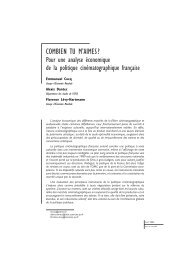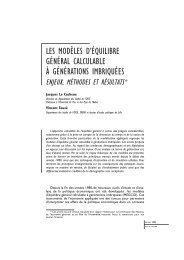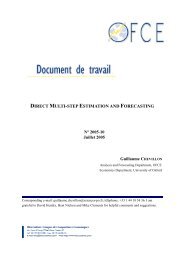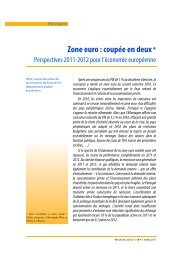N° 2005-09 Juin 2005 Guillaume Daudin* Jean-Luc Gaffard ...
N° 2005-09 Juin 2005 Guillaume Daudin* Jean-Luc Gaffard ...
N° 2005-09 Juin 2005 Guillaume Daudin* Jean-Luc Gaffard ...
Create successful ePaper yourself
Turn your PDF publications into a flip-book with our unique Google optimized e-Paper software.
III. INTERNATIONAL RELOCATION AND DEINDUSTRIALISATION:SOME FRENCH PERSPECTIVESCatherine Mathieu and Henri Sterdyniak *International relocation has become a topical issue in recent months, in France aselsewhere in Europe. The debate is not new, but while it was focusing 12 years ago ontraditional industries and trade with emerging Asia, it includes now higher value-addedgoods and trade with CEEC’s. The article deals first with the impact of internationalrelocation on employment in Europe and the need for policy answers. A variety of strategiesare then addressed: making France more attractive in a free market world, making Francemore competitive in line with the Lisbon Agenda, supporting growth through highereducation, research and innovation spending; promoting innovating companies;implementing employment measures in favour of the lower skilled. Last, in a Europeancontext, should tax and social harmonisations be favoured? Should a French or a Europeanstrategy be implemented?1. IntroductionGeneral public debates on international relocation in the EU-15 generally focus on theprocess in its narrow sense: a company closing a plant in one of EU-15 countries whilesimultaneously opening a plant in a low-wage emerging country where it will produce goodsat lower costs to be offered on the same market as previously. We will consider hererelocation processes in a broader sense: production relocation from ‘Northern’ countries tolow-wage economies, initiated by a ‘Northern’ company choosing to locate or to outsourcepart of or all its production in a Southern area; a ‘Northern’ company leaving its ‘Northern’supplier of intermediate consumption purchases for a supplier in a southern country; a‘Northern’ company of the trade sector leaving a supplier in a ‘Northern country’ for asupplier in a ‘Southern’ country; a ‘Southern’ company winning market shares over‘Northern’ companies, first in its domestic market, then in third countries and finally in‘Northern’ countries themselves. International relocation processes are difficult both tomeasure and to stop.International relocation or in other words ‘delocalisation’ will be addressed in this paperfrom a French policy perspective. The issue was already very topical 12 years ago and* OFCE. catherine.mathieu@ofce.sciences-po.fr; sterdyniak@ofce.sciences-po.fr50








